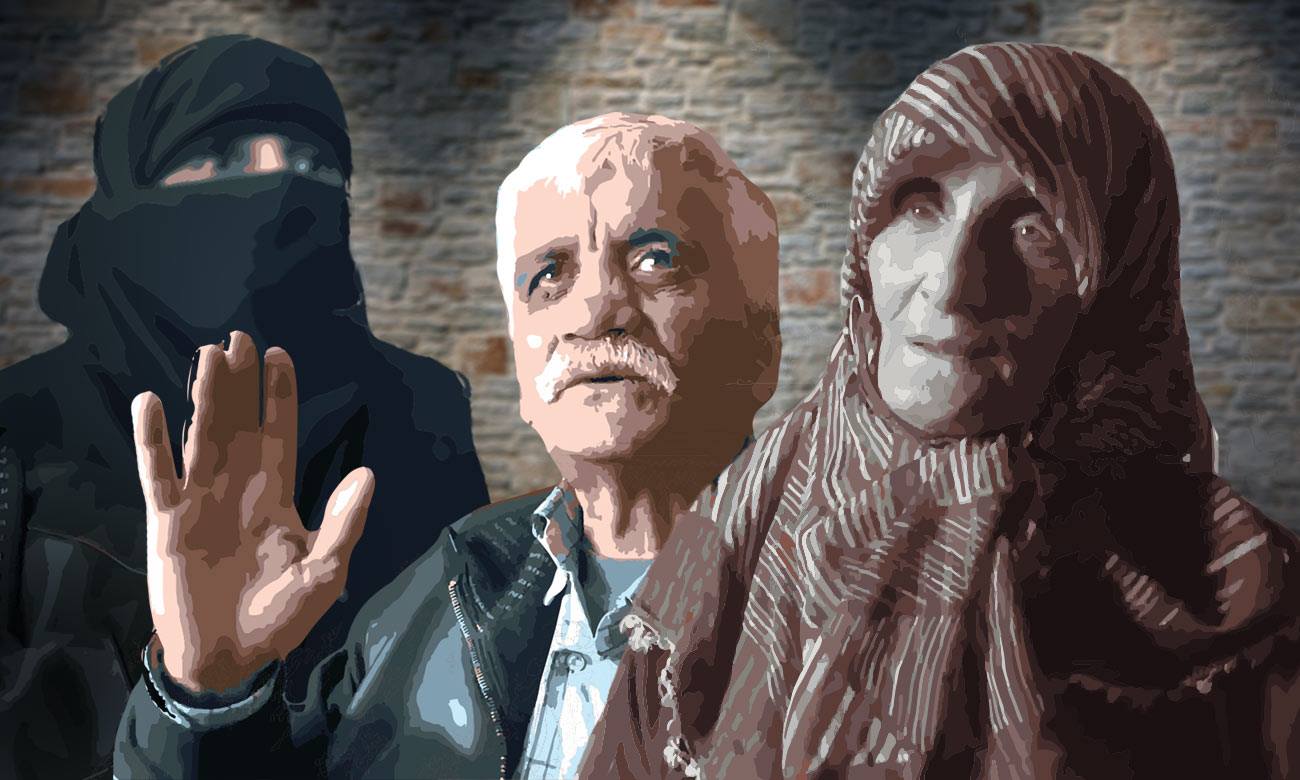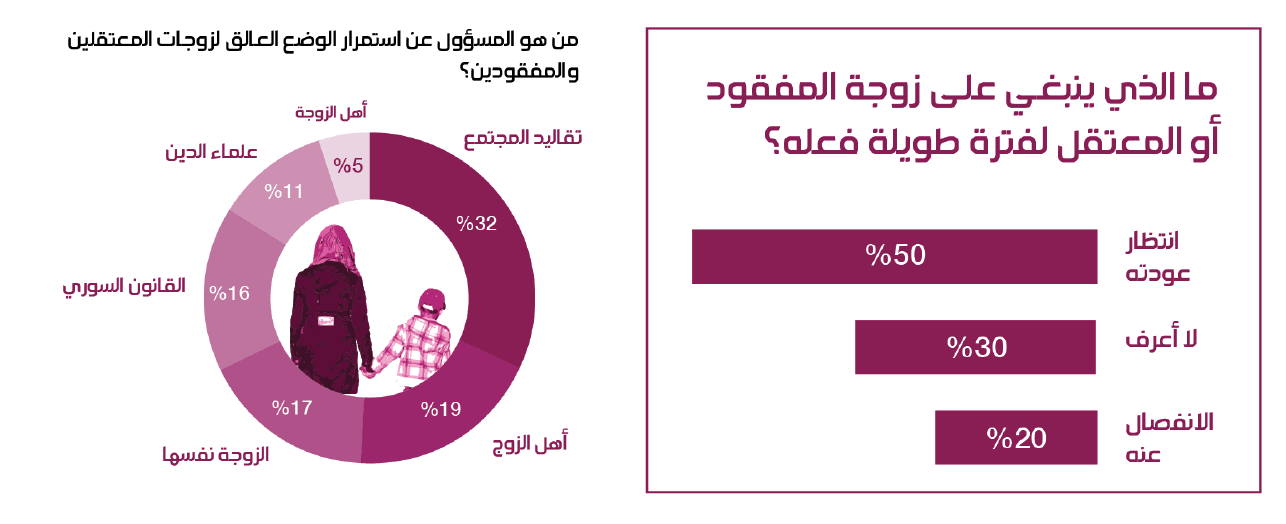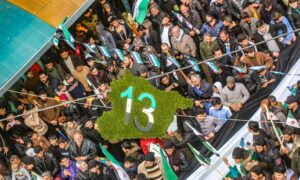Enab Baladi Investigative Team
The six years of the Syrian revolution witnessed the emergence of many problems that were hidden below the surface of Syrian society. The war, which has struck Syrians, has also exacerbated existing social crises that aredirectly linked to the current context of insecurity.
The most widespread social crises seem to be those relating to women. Women are the most affected social group, whether as bereaved mothers, widows bearing the burden of supporting their families, or wives of the disappeared, living through the tragedy of perpetual waiting, heavy responsibilities and faced with questions from society to which they have no answers.
The issue of wives of detainees and missing persons is one of the thorniest problems, which has left thousands of Syrian women, whether inside Syria or elsewhere, facing the burdens of life on their own, amidst great controversy over how to resolve their situation. This is difficult given the complexities of society, legal obstacles and theological interpretations.
In light of the prevailing security and economic situation in Syria, the personal concerns of the wives of detainees and missing persons seem less important than economic, social, and sometimes, security considerations. This leaves women with a limited number of options that do not necessarily reduce the complexity of their situation but can ease part of the pressures they face.
In this article, Enab Baladi seeks to shed light on the plight of these women by presenting real stories of situations in which the wives of detainees and missing persons faced a choice between either waiting for their husbands or seeking to separate from them due to several factors, including social, economic and psychological factors.
The article also discusses the Islamic opinion on the issue of separation between husband and wife where the husband is absent, as well as the legal aspects of this issue and the views of psychologists and sociologists in an attempt to capture the most important aspects that are supposed to set clear parameters for this issue.
The wives of detainees … Separation or waiting?
“All I think about right now is my child”, Umm Abdullah repeated this over and over, as if she was trying to justify what no one was forcing her to justify. Nevertheless, she expects a war of different opinions concerning her life choices, which she has had no control over for the past three years.
We met Umm Abdullah in the Labor Office in Istanbul. It did not take a stranger long to gain her trust and she soon began to tell her story. Her quick words hid dozens of answers to questions she had long waited to be asked.
“The Syrian security forces arrested my husband in front of me on the Syrian-Lebanese border in 2014”, said Umm Abdullah, while describing the moment that marked a turning point in her life.
She was one-month pregnant and had only been married for three months. She returned on her own to Damascus after a “travel ban”. In the summer of 2014, she was forced to travel illegally to Turkey due to security harassment linked to the arrest of her husband. She spent the next few years of her life moving between her relatives’ houses and between collective housing for young women.
“Now I live with my father and my sister in this big city, we have no one to rely on but God”, Umm Abdullah skimmed over the past three years to talk about her current situation. “I worked in more than one place and each time, I had to leave because I was being exploited by my boss. Many of those I worked for refused to pay me because I refused to give them what they wanted. I was hassled and sexually harassed because I was single, without any man to protect me”.
During our meeting, Umm Abdullah did not say anything about wanting to remarry but her story was enough to prompt us to ask her about that. Her only reply was that the reports of her husband’s fate after his arrest were contradictory. Many of those who were with him in detention and were released tell her that “he may not come out again”. She no longer sees any point in waiting.
Umm Abdullah has applied to a Sharia court in Idlib to obtain a fatwa to separate from her husband. She previously consulted Syrian clerics in Istanbul but was not given a clear opinion on her status. She also refused to resort to Syrian regime courts that give her the right to separate after one year’s absence by her husband. She preferred to resort to Sharia scholars in Idlib who have dealt with hundreds of similar cases and given dozens of fatwas (legal opinions) allowing wives to separate from their absent husbands.
Given the lack of a standard unifying fatwa concerning separation between wives from absent husbands, the opinions of Islamic clerics vary. A former Sharia judge in Idlib, Ayman Mohssi, sees that a woman who “has no information about the whereabouts of her detained husband must wait for four years, according to the Maliki doctrine, unless she faces significant harm, in which case the wife can ask for separation after her husband has been absent for one year”.
Sheikh Ayman Mohssi’s opinion is consistent with the decision by the Islamic Fiqh Council of the Muslim World League issued in Mecca during its 11th session in 2013. This decision confirmed that the wife is entitled to request separation after a period of absence of no less than one year and not more than four years. However, Sheikh Mujir al-Khatib, a former teacher at Islamic institutes in Damascus, points out the “absence of a hadith sahih (authentic saying of the Prophet Muhammad) to determine the fate of the wife of a missing person. There are only jurisprudential interpretations and the words of the Sahabah (companions of the Prophet Muhammad)”. The Hanafi and Shafi’i schools of thought state that “the wife of an absentee has no right to annul the marriage contract until the death of his peers”, pointing out that waiting for four years before separation can be justified in cases of war.
Even though most Sharia judges in the liberated areas issue fatwas allowing separation once the husband has been absent for one year, Umm Muhammad, who Enab Baladi met in the city of Idlib, confirmed that although her husband has been detained for almost six years, she has never thought of separating from him or getting married to someone else. She said, “Kids are the most important thing in the life of a woman, who can rely on herself to earn a living for her kids, defying all the economic obstacles to finding a job and all the pressures from family.”
On the other hand, Umm Abdullah confirms that her two-and-a-half-year-old child is the main reason that pushed her to separate from her husband and remarry after experiencing huge difficulties abroad and realizing that, “unless she achieves stability and feels safe”, she cannot provide a decent life for her son.
While children are Umm Muhammad and Umm Abdullah’s main concern, other women prioritize their own interests and leave their children to face an uncertain fate.
Umm Nader, a grandmother who lives in the city of Idlib, confirmed to Enab Baladi that the wife of her detained son left her five children in Umm Nader’s care before leaving to marry another man in the city of Latakia. Umm Nader added that the mother of the children had claimed ownership of the family’s property and had hired a lawyer for that purpose.
Society’s views differ in judging such cases. Social and psychological specialists tend to support the right of women to separate and remarry due to the absence of their husbands. Psychologist Dr. Omar al-Nimr believes that women have physiological and psychological needs that make living alone “a huge burden” for them, as well as forcing them to bear responsibilities that they cannot undertake without support.
Umm Abdullah, who is waiting for the necessary procedures to obtain her right of separation in the liberated areas to be completed, believes that psychological, social and economic justifications represent only a small part of the reasons for requesting separation. She emphasized that the burden of guaranteeing her son’s future, which she cannot bear on her own, is the reason why she needs to obtain a separation, which might enable her to start a new life.
Wives’ fate as uncertain as their husbands’
When the public demonstrations against the al-Assad regime started in 2011, a campaign of raids and arbitrary arrests started (and has yet to end), leaving behind wives and children who were tired of waiting for years for the return of those detained.
Some of those fathers were arrested from their homes in front of their families. Others were arrested alone in the street without their families knowing anything other than the fact that they have gone missing.
In the hope that their husbands will come back, most of the wives of those missing and detained organize their lives according to a set routine, constrained by the customs and traditions of a “conservative” society in the face of the most difficult economic and security conditions without a breadwinner and source of support.
Wives imprisoned by endless waiting
The wives of detainees find that they are treated with sympathy by those around them, although this sympathy gradually fades as their husbands’ absence grows longer and with the absence of any news of their fate and the eventual loss of hope that they are still alive.
Due to the Syrian regime’s policy of torturing and killing detainees and concealing their whereabouts from their families, most people now assume that if there is no news of a detainee’s whereabouts, this means that he is most likely “dead”.
If he is alive, the detainee often sends news to his family through one of the detainees who the regime releases for certain reasons.
Syrian authorities prevent detainees from communicating with a lawyer or any of their relatives, and they are held in the intelligence services’ prison cells without trial.
During the first years of widespread detentions, it was common practice for a detainee’s family to pay thousands of dollars to some security officers to find out the location of the detainee and to know whether or not he was still alive. However, this is no longer possible since many security officers were interrogated and punished by their superiors, although there are some exceptions.
It has become difficult for wives to find out in which security branch their loved ones are being held. The luckiest wives are those whose husbands are moved to the central prison in the city of Adra in the countryside of Damascus, where detainees are allowed one visit a month. These cases are rare and do not include “political” detainees.
Numbers and statistics
While there are no official statistics, the Syrian Network for Human Rights has documented the names of 117,000 Syrian detainees. However, estimates suggest that the number exceeds 215,000 detainees, 99% of whom are in Syrian regime prisons. There are no statistics or estimates regarding the number of spouses of those who are detained or missing.
Human rights networks face huge difficulties in counting the number of detainees because their families refuse to give their names as they are afraid that this will expose them to grave danger or torture. Most of the information these networks obtain are from former detainees.
These figures appear in the absence of statistics on the part of international human rights organizations and the United Nations, which are unable to force the Syrian regime to reveal the number of detainees in its prisons.
When families of detainees or international human rights organizations request such information, the Syrian government often denies carrying out arbitrary arrests or kidnappings.
Meanwhile, the Democratic Republic Studies Center conducted a study that revealed that, up until the end of 2015, there were more than 110,000 Syrians missing in “mysterious” circumstances, which may include kidnapping and murder outside prisons.
Concerning Syrian wives who are refugees, the UN High Commissioner for Refugees (UNHCR) conducted a study in 2014 titled “Syrian refugee women’s fight for survival” in which it revealed that more than 145,000 Syrian refugee families are headed by women who are “fighting to keep their children alive” on their own.
The report covered 135 refugee women who have taken on the responsibility of caring for their entire families due to their husbands’ absence either due to arrest, disappearance or death.
Wives who have no breadwinner “unfairly treated” by society
Syrians are facing poor economic conditions due to rising prices and the decreasing value of the Syrian Lira, but the impact of the economic crisis on the wives of detainees is greater due to the absence of the main breadwinner.
It is often difficult for a detainee’s wider family to be able to support his wife and children, as is the case for the wife’s family. Thus, she is obliged to work to be able to support her children and to reduce, partially, the burden on her family and her husband’s family.
When the period of absence begins to grow longer, the wife of a detainee may receive marriage proposals, which she must think carefully about before making a decision as she is still married to another man.
What makes her reject these proposals are society’s views and its deep-rooted customs, which reproach her for thinking of separating while her husband suffers between the walls of a detention center, while she seeks her own “happiness”, taking no notice of her suffering in her husband’s absence.
“Conservative” Syrian families often refuse to encourage their daughters to request to be separated from their absent husbands, preferring to comfort them and encourage them to wait for their husbands’ return.
Complexities in liberated areas’ judicial bodies
The liberated areas in Syria are witnessing judicial difficulties due to a lack of common legal references and the multiplicity of parties who appoint themselves to oversee the judiciary. Despite the fact that Syrians in these areas are turning to Sharia bodies, which are usually able to fulfill their needs, there remain some matters that cannot be resolved, as they are linked to the Syrian regime’s judicial records.
“Separation due to the absence of the husband” in religion, law and psychology
The Islamic Shari’a is considered the main reference for personal status laws in Syria. However, the issue of legal separation due a husband’s absence, which is determined by the Personal Status Law, is an issue over which there are different jurisprudential opinions, Meanwhile, psychologists and sociologists greatly support separation due to psychological and physical considerations relating to women.
Doctrinal differences and jurisprudential innovations
Jurisprudential opinions differ concerning the option for a married woman to demand separation due to the absence of her husband. Jurists who support allowing women to divorce due to their husbands’ absence also differ concerning the amount of time that should pass before women can legally separate from their husbands.
This divergence in views is a result of the absence of a religious text in the Holy Quran or the sayings of the Prophet to settle the issue definitively. Fatwas on this question use independent reasoning and the consensus view is represented by the decision of the Muslim World League’s Islamic Fiqh Council, which confirmed that married women have the right to request separation after a period of no less than one and no more than four years.
The Council’s decision, issued in its 11th session in 2013 in Mecca, states, “It is up to the judge to determine the period, although it should be no less than one year and no more than four years, starting from the day that the husband went missing. Modern methods should be used to search for the husband, and the judge should take into consideration the circumstances and details of each case, and issue an opinion based on that.”
However, during our interview with sheikh Mujir al-Khatib, a former teacher in several Sharia institutes in Damascus, he pointed out that there is no authentic Hadith to determine this issue, only juristic interpretations and the sayings of Sahaba. Both the Hanafi and Shafi’i Sunni Islamic schools of jurisprudence state that the wife is not allowed to annul the marriage contract until her husband’s peers have died (or once all those the same age as the husband are believed to have died).
On the other hand, the Maliki school allows wives to separate from their missing husbands after a period of no less than four years. This fatwa is attributed to Omar Ibn al-Khattab, the Muslim Caliph. The Hanbali school combines all the schools mentioned above, according to the wife’s status. According to this school, the issue is divided into two cases – the first is where the husband’s absence indicates death. If this is the case, the wife can annul the marriage contract after four years of absence, on the condition that she must observe the mourning period. The second case is where the husband’s absence does not indicate death. In such a case, she must follow the fatwa of the Shafi’i and Hanafi schools.
According to sheikh Yasser al-Najjar, the absence of detainees in Syria since 2011 with the war and deteriorating conditions, is “an absence that causes the demise of the wife and children”.
The majority of Syrian religious scholars agree that the maximum period of time that a wife should wait before being allowed to separate from her husband is four years, in cases where the husband has left an adequate financial income for her. If this is not the case, she has the right to apply to the judge after six months of absence, based on a fatwa by Imam Ahmad and Said Ibn Musayyab.
Islamic courts in the liberated areas, one of which we contacted in the city of Idlib, are following Imam al-Shafi’i’s fatwa but they take into consideration the wife’s conditions and allow exceptions according to each wife’s situation. They usually allow wives to separate from their husbands after one year of absence.
Article 109 of the Syrian Personal Status Law
Syrian law dedicates a detailed article to the issue of separation between wives and absent husbands. This article states that a wife has the right to request separation after a year of her husband’s absence, on the condition that there are witnesses from the husband’s and wife’s families to confirm his absence for at least one year.
Enab Baladi spoke to a lawyer in regime-held areas to learn about the rights of a wife after completing the legal procedure for obtaining a separation. The lawyer confirmed that the wife can get the muqaddam (the unpaid dowry) by asserting a claim to her husband’s property to sell at auction, if she so wishes.
The lawyer, who asked not to reveal her name for security reasons, pointed out that the mother is allowed to keep her children who are at the age of maternal custody. However, if they are over the age of maternal custody, they should be taken care of by the parents of the absent husband.
Concerning “revocable divorce”, the lawyer explained that the wife could get back together with her husband if he returns or he is released from prison within three months of the divorce decision (i.e. during the idda period, the period following divorce or death of a husband during which the wife must not remarry). However, if he returns after this period, they can only get back together through a new marriage contract.
Psychological and physical needs allow wives the right to request separation
To explore the psychological aspect of the issue, not far from Sharia and legal aspects, Enab Baladi interviewed Dr. Omar al-Nimr, an expert in psychology, who pointed out that wives have psychological, physical and economic needs, whose lack of fulfillment might lead to the loss and fragmentation of the family.
Dr. al-Nimr says that, like other wives, the wife of a detainee needs a breadwinner to manage the family’s affairs and bear the economic burden of providing the basic necessities of life amid rising prices in the country.
Since the absence of the breadwinner may cause the wife psychological distress and leave her at a loss what to do, feeling that she is a “burden” on others. This forces the wife to assume a responsibility that might be greater than her capacity. However, meeting the basic economic needs of a detainee’s wife does not solve her psychological problems, according to the doctor, who pointed out that feeling safe is no less important than material needs, as a wife and children lack a feeling of safety in the absence of the head of the family.
He added, “Every woman needs a partner who helps her to carry the burdens and hardships of life with her and bear the responsibility for the children, which could be difficult for the wife to bear alone”.
Dr. al-Nimr pointed out that the Sharia and law do not hold the wife responsible for something that is beyond her capacity, as they allow her to separate from her husband if he has been absent for one year. However, he advised every wife who is able to bear the burden of life alone to wait for her husband until he is released, since marrying another man may break up her family since she would lose the right to custody of her children and the children would lose their mother and father. He continued, “The wife would be in a worse psychological state if her detained husband comes out to find that she is with another man.”
Dr. al-Nimr mentioned that social norms often restrict the wife of an absent husband, since she fears the gossip that may spread if she asks to separate. Thus, women in this situation are obliged to endure hardship that has a negative impact on all aspects of her life.
He pointed out that these customs often take precedence over Sharia and law, which give wives the right to separate from an absent husband. He called for raising awareness in society through well-designed programs highlighting the difficult conditions of the wives of detainees and encouraging people to be more understanding towards requests from these women to separate from their husbands.
What should the wife of a missing person or a long-term detainee do?
Enab Baladi ran a poll on the situation of the wives of long-term detainees and missing persons. Those who participated criticized the social customs that undermine a woman’s right to remarry when her husband is absent.
Enab Baladi’s correspondent in Idlib in northern Syria interviewed many people to ask for their opinion on the issue. Enab Baladi’ also conducted an online survey via its website, which posed the question: what should the wife of a detainee or a husband who has been missing for many years do?
The conditions of wives who decide to remarry again
The poll revealed that 50% of the participants agreed that a wife in such a situation should wait for her detained husband until his release. Umm Salama, one of the participants in the survey and the wife of a detainee, holds this opinion and advised other women not to rush into requesting a separation. She said, “A woman should be patient, hope for the release of her husband and devote herself to raising her children”. She warned against the consequences of marrying another man as doing that would risk having her children separated from her.
However, the rest of the participants from the city of Idlib took the view that it depends on the circumstances of each wife and her own convictions, pointing out that remarrying is not “wrong” under the Sharia and the law.
Mohammed Maktoum said, “Every wife has her own personal circumstances. If she can bear the burdens of life, she should be patient and avoid remarrying.” He added, “If there is no breadwinner to support the wife and children, a woman has to protect herself by remarrying.”
ShariaSharia permits but society “forbids”
Given that the issue is “unresolved”, as legislators disagree on it, this has created confusion among the public. In fact, 31% of respondents on the website replied, “I do not know” when asked what the wife of a detainee should do.
Umm Adnan, who spoke to Enab Baladi’s correspondent in Idlib, confirmed that the popular view is that social customs and fear of gossip are the main barriers for women when making a decision to separate from their husbands.
According to Umm Adnan, “Wives are granted the right to remarry by Sharia but social norms are so harsh on women. These customs are not applied to the opposite sex. A man is allowed to marry just a few days after the death of his wife.”
In addition, 19% of the respondents said that a wife should request to separate if her husband is absent for a long time. Ayman Nabaa, a resident of the city of Idlib, holds this view, “The wife must wait for her husband according to the period specified by the Sharia. After that, she should remarry because she has financial and physical needs.”
“The lack of a breadwinner obliges the wife of a detainee to remarry”
Most of the respondents agreed that the husband’s family must support the wife if her husband left her with no source of income. Umm Abdul Aziz, who spoke to our correspondent, encouraged every wife who has a husband in prison to bear the responsibility and “rely on herself to support her children without resorting to help from others, by finding a job suited to her abilities”.
The survey participants said that the main reason forcing a woman to ask for separation from her absent husband is the deterioration of her financial situation and the absence of the main breadwinner for the family.
Umm Yazan, the sister of two prisoners, asserted that the wife’s “poor” relationship with her husband and his family might also convince her to ask for separation when he is absent. Umm Muhammad, the wife of a prisoner, said, “I really love my husband and can’t imagine being married to another man, even if I had to wait for him my whole life.”
Women’s associations provide “psychological support” to wives of detainees
Civil society organizations and women’s associations in the liberated areas of Syria have paved the way for Syrian women to participate in various activities and express themselves through them. They also play a role as the main sources of psychological and financial support for women.
These associations have given great importance to the wives of detainees and martyrs given their lack of a breadwinner for financial support. These organizations try to offer them support through employing them in small-scale projects or providing direct financial assistance. They also provide psychological support and educational lectures.
The director of the Women’s Committee for Empowerment of Women and Children in Idlib, Roula Shehadeh, told Enab Baladi that the conditions of the wives of detainees and martyrs are among the most sensitive cases dealt with by women’s associations. She pointed out that these associations cannot assist women in matters relating to separation or divorce.
According to Shehadeh, the Committee provides support to around four thousand women with detained or missing husbands through psychological and religious educational programs. The Committee also aims to psychologically prepare women to face decisions of their families and social conditions that go against women’s preferences.
The director also explained that 90% of the wives of detainees and missing persons who are supported by the association were able to legally separate from their husbands after submitting a request to a Sharia judge. However, she noted that most of these women have not registered the divorce in the regime’s official civil courts, which means that they are still married to their first husbands according to official records.
According to Shehadeh, only 1% of women covered by the Committee’s activities receive a “revocable divorce”, which enables them to return to their first husbands if they return.
Most of these women marry older men, often as second or third wives, while a few prefer to wait for their absent husbands, defying social pressures.
The director of Fajr al- Maraa al-Souriya Hawa women’s association in Daraa, Hayat al-Eid, said that women who apply for separation in the Sharia courts are often young and have children, which exposes them to family pressures forcing them to divorce to avoid being judged by society.
These associations cannot completely resolve the issue of the wives of detainees and missing persons. However, the methods of psychological support they provide are important tools for empowering women to face society. Women’s associations can provide these women with job opportunities, which may be a start to finding a solution to a crisis that is directly linked to the difficult economic situation of women who bear the responsibility of supporting entire families.
if you think the article contain wrong information or you have additional details Send Correction
النسخة العربية من المقال
-
Follow us :
Most viewed
- Saudi Arabia to prosecute sheikh Saleh al-Shami and ten Syrians in May
- Hidden aspects of Iranian consulate building targeted in Damascus
- Liwa al-Quds mourns 22 members following attack on military bus in Homs countryside
- Israeli strikes target military airports in southern Syria
- Jordan calls for continued support for Syrian refugees on its territory


















 A
A
A
A
A
A










 More In-Depth
More In-Depth